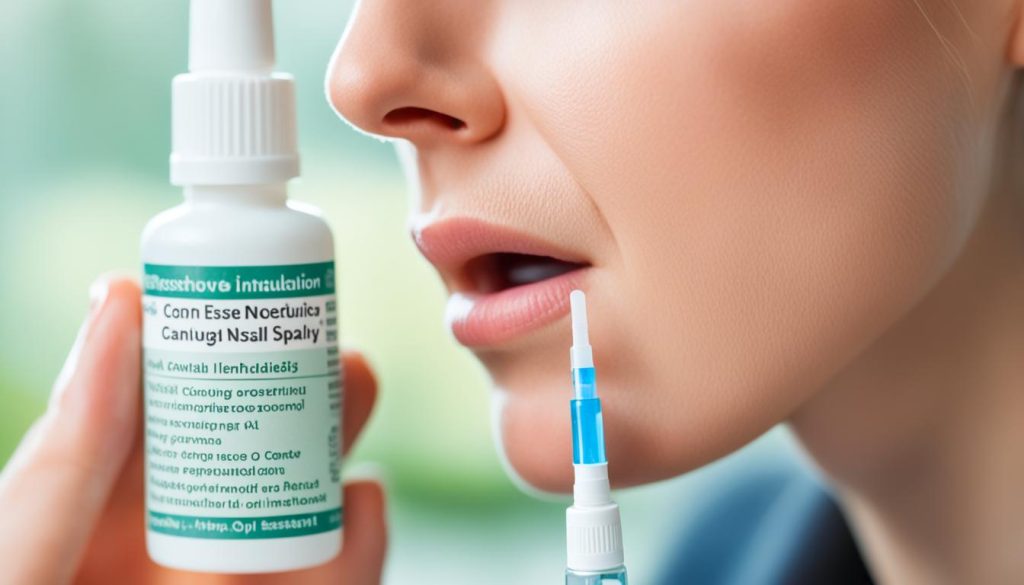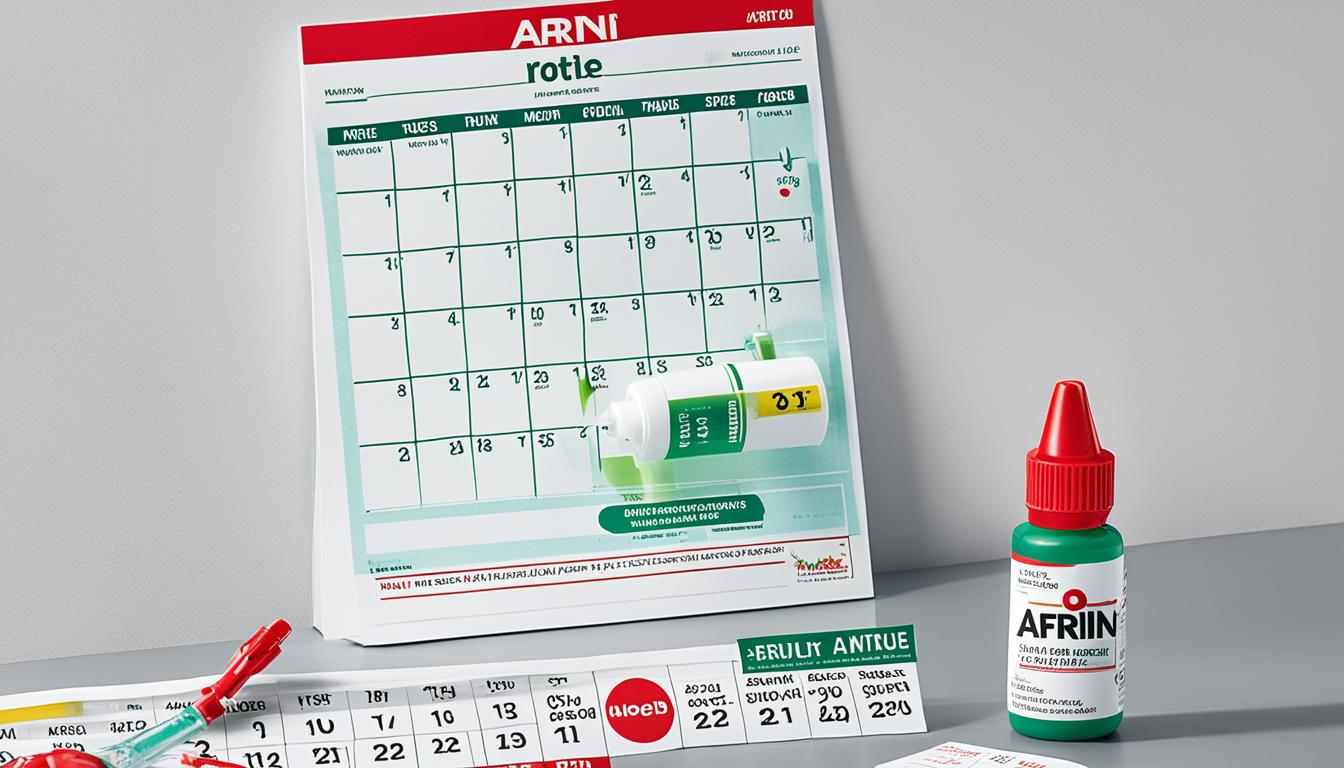Did you know that using Afrin nasal spray for more than 3 days can lead to rebound congestion and other complications?
Afrin® is a popular nasal decongestant that provides quick relief from nasal congestion caused by colds and allergies. However, it is essential to follow the recommended usage guidelines to avoid potential risks and side effects.
In this article, we will explore the recommended usage cycle for Afrin® nasal spray, the risks and side effects of overuse, safe alternatives for nasal congestion relief, and tips for managing congestion without medication. We will also discuss when it is safe to use Afrin® again after a 3-day cycle.
Whether you have been using Afrin® for 3 days or want to know more about how to use it safely, this article will provide you with valuable information to ensure effective and responsible nasal congestion relief.
What is Afrin and How Does It Work?
Afrin® is a topical nasal spray decongestant that provides relief from nasal congestion caused by colds and allergies. It contains chemicals that shrink congested blood vessels in the nose, allowing for open and clear passages. By reducing the swelling in the nasal tissues, Afrin® helps alleviate symptoms such as a stuffy or blocked nose, allowing for easier breathing.
To use Afrin® nasal spray, follow these instructions:
- Gently blow your nose to clear any mucus or obstructions.
- Shake the Afrin® nasal spray bottle well.
- Remove the cap from the bottle.
- Tilt your head slightly forward and insert the spray nozzle into one nostril, aiming towards the back of the nose (not towards the center of the nostril).
- Close the other nostril by gently pressing it closed with your finger.
- Breathe in gently through your nose and simultaneously press down on the spray nozzle to release one spray. Do not inhale through your mouth.
- Repeat steps 4 to 6 for the other nostril if required.
- After using, wipe the spray nozzle clean and replace the cap tightly.
Note: It is important to read the complete Afrin® product label and follow the instructions provided, as specific usage instructions may vary.
When using Afrin® nasal spray, it is necessary to take certain precautions:
- Do not exceed the recommended dosage and duration of use. Using Afrin® for more than three consecutive days can lead to rebound congestion, which worsens the symptoms of nasal congestion and creates a dependence on the medication.
- Do not use Afrin® if you have a known allergy or sensitivity to any of its ingredients.
- Consult with a healthcare professional before using Afrin® if you have any pre-existing medical conditions or are currently taking other medications.
- Avoid spraying Afrin® directly into the eyes or mouth.
- Store Afrin® nasal spray at room temperature and away from direct sunlight or excessive heat.
| Pros | Cons |
|---|---|
| – Provides quick relief from nasal congestion | – Can cause side effects such as nasal irritation or burning sensation |
| – Easy to use | – Overuse can lead to rebound congestion |
| – Can be effective in treating colds and allergies | – Not suitable for long-term use |
In summary, Afrin® nasal spray is a topical decongestant that works by shrinking congested blood vessels in the nose, providing relief from nasal congestion. It is important to follow the provided instructions for safe and effective use and to take precautions to avoid rebound congestion and other potential side effects. Consult with a healthcare professional if you have any concerns or questions about using Afrin® nasal spray.
After Using Afrin for 3 Days When Can I Use It Again
Overusing Afrin® nasal spray for more than 3 days can lead to a rebound phenomenon, also known as rhinitis medicamentosa. This occurs when the blood vessels in the nose stop responding to the medication, causing nasal congestion to worsen.
Afrin® is a powerful nasal decongestant, but using it for an extended period can result in dependence and a cycle of worsening congestion. This is why it is crucial to adhere to the recommended usage guidelines and not exceed the recommended duration of use.
“Long-term use of topical nasal decongestants such as Afrin® can result in a condition called rhinitis medicamentosa. The nasal tissue becomes dependent on the medication, and when the effects wear off, the congestion returns with a vengeance.”
Avoiding the rebound effect requires strict adherence to the guidelines provided on the packaging. Do not use Afrin® nasal spray for more than three days unless directed by a healthcare professional.
Additionally, prolonged use of Afrin® can lead to chronic sinusitis, a condition characterized by inflammation of the sinuses. This can result in facial pain, headache, and persistent congestion. Consult a healthcare professional if you are experiencing chronic nasal congestion or suspect sinusitis.
It is crucial to understand the potential risks and side effects associated with using Afrin® nasal spray and to use the medication as directed. If you have concerns or experience any unusual symptoms while using Afrin®, consult with your healthcare professional for guidance.
The Dangers of Reapplying Afrin Medication Too Soon
Some individuals may be tempted to reapply Afrin® nasal spray sooner than the recommended interval due to persistent nasal congestion. However, this can exacerbate the rebound effect and increase the risk of side effects.
Reapplying Afrin® before the recommended time frame can disrupt the normal nasal physiological response and lead to a cycle of worsening congestion. It can also increase the likelihood of developing chronic sinusitis and other complications.
To ensure safe and effective use of Afrin® nasal spray, it is crucial to follow the recommended reapplication guidelines. After using Afrin® for three days, wait at least 12 hours before using it again.
Consult with a healthcare professional if you are unsure about when it is safe to use Afrin® nasal spray again or if you have any concerns about its usage.
Remember, the correct and responsible use of Afrin® nasal spray can provide effective relief from nasal congestion while minimizing potential risks and side effects.
| Side Effects of Prolonged Afrin® Usage: | Risks of Reapplying Afrin® Too Soon: |
|---|---|
|
|

Alternatives to Afrin for Nasal Congestion Relief
If you are looking for alternatives to Afrin® for nasal congestion relief, there are several options available. It’s important to find what works better than Afrin® and what is a safe alternative to Afrin? Depending on your specific needs and medical conditions, here are some alternatives to consider:
1. Oral Antihistamines and Decongestants
Oral antihistamines and decongestants can provide relief from nasal congestion. They work by reducing inflammation and shrinking blood vessels in the nasal passages. However, it’s vital to consult with your healthcare professional before taking any oral medication to ensure it is safe and suitable for you.
2. Nasal Saline Solutions
Nasal saline solutions, like nasal rinses or Neti pots, can help flush out congested airways and relieve nasal congestion. These solutions are made of a mixture of salt and water and help moisturize the nasal passages for better breathing. It is recommended to use sterile or distilled water for nasal rinses to minimize the risk of infection.
3. Steam Inhalation
Steam inhalation involves breathing in warm, moist air to help open up the nasal passages and alleviate congestion. This can be done by leaning over a bowl of hot water, covering the head with a towel, and inhaling the steam. However, be cautious and avoid extremely hot water to prevent burns.
4. Humidifiers
Using a humidifier at home can add moisture to the air, which can help relieve nasal congestion. It is recommended to keep the humidity level between 30% and 50% to prevent excessive moisture that may promote the growth of mold and mildew. Proper cleaning and maintenance of the humidifier are essential to prevent bacterial growth.
5. Consult with Your Healthcare Professional
Before trying any alternative to Afrin® or implementing any new treatment, it is crucial to consult with your healthcare professional. They can assess your condition, provide personalized advice, and recommend the best alternative for you based on your specific needs and medical history. They will be able to guide you on what works better than Afrin® and what is a safe alternative to Afrin? Choose an alternative that is safe and effectively addresses your nasal congestion.
| Alternative | Benefits | Considerations |
|---|---|---|
| Oral antihistamines and decongestants |
|
|
| Nasal saline solutions |
|
|
| Steam inhalation |
|
|
| Humidifiers |
|
|
Remember, finding the right alternative to Afrin® depends on your individual circumstances. Consult with your healthcare professional to determine what works better than Afrin® and what is a safe alternative to Afrin? They will provide guidance tailored to your needs, ensuring effective relief from nasal congestion.

Tips for Managing Nasal Congestion Without Medication
If you prefer to manage nasal congestion without medication, there are several tips you can try. These methods can provide relief and help alleviate congestion symptoms. Here are some strategies that can be effective:
1. Avoid Triggers
Avoiding triggers that can worsen nasal congestion is crucial. Identify allergens or irritants that trigger your symptoms and take steps to minimize exposure to them. Common triggers include dust mites, pollen, pet dander, and cigarette smoke.
2. Use a Humidifier or Steam Inhalation
A humidifier can be a valuable tool in managing nasal congestion. It adds moisture to the air, which helps soothe dry nasal passages and reduces congestion. Alternatively, steam inhalation can also provide relief by moisturizing the nasal passages. Fill a bowl with hot water, drape a towel over your head, and inhale the steam for several minutes.
3. Nasal Irrigation with Saline Solutions
Nasal irrigation, also known as nasal rinsing, involves flushing out the nasal passages with a saline solution. This helps clear mucus, reduce inflammation, and relieve congestion. You can use a specially designed nasal irrigation device or a neti pot to perform the rinsing safely.
Remember to follow safety guidelines when using nasal irrigation devices and consult with a healthcare professional for personalized advice on how to use them safely and effectively.
By following these tips, you can manage nasal congestion naturally without relying on medication. However, if your symptoms persist or worsen, it is important to consult with a healthcare professional for further evaluation and guidance.

Note: Always consult with your healthcare professional before making any changes to your healthcare routine.
When Is It Safe to Use Afrin Again?
After using Afrin® nasal spray for 3 days to relieve nasal congestion caused by colds or allergies, it is important to follow the recommended guidelines for reapplication. To ensure safe and effective usage, it is advised to wait at least 12 hours before using Afrin® again. This allows your nasal passages to recover and reduces the risk of developing rebound congestion.
Using Afrin® more frequently or for a longer duration than recommended can lead to potential complications, including the rebound phenomenon or rhinitis medicamentosa. Rebound congestion occurs when the blood vessels in the nose become dependent on the medication, causing congestion to worsen when the effects wear off.
By adhering to the specified timing intervals, you can minimize the risk of rebound congestion and maintain the effectiveness of Afrin®. If you have any concerns or questions about the appropriate timing of Afrin® usage, it is always best to consult with a healthcare professional for personalized advice.

| Duration of Afrin® Usage | Recommended Wait Time Before Reapplication |
|---|---|
| 3 days | At least 12 hours |
Conclusion
In conclusion, Afrin® nasal spray is an effective solution for relieving nasal congestion caused by colds and allergies. It works by shrinking the congested blood vessels in the nose, providing quick relief. However, it is important to use Afrin® correctly and follow the recommended usage guidelines.
After using Afrin® for three days, it is crucial to wait at least 12 hours before reapplying the nasal spray. This helps prevent rebound congestion and potential risks associated with prolonged use. If you have any concerns or are uncertain about when it is safe to use Afrin® again, it is always best to consult with your healthcare professional for personalized advice.
Remember, while Afrin® can provide immediate relief, it is essential to use it responsibly and not exceed the recommended usage. Your healthcare professional can provide guidance on proper usage, any potential side effects, and safe alternatives if needed. Take care of your nasal health and seek professional advice when necessary to ensure effective and safe congestion relief.




